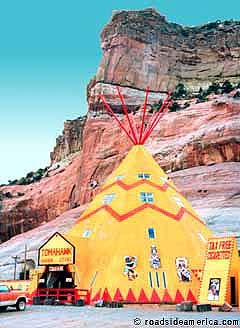America's biggest Indian reservation tries to stimulate private enterprise
Anybody who wants to set up shop in the reservation must conduct an archaeological survey, obtain a letter of support from the tribe's president and jump through up to a dozen other hoops. These regulations, put in place to protect Indians from white traders, now bind native entrepreneurs large and small. Timothy Halwood recently obtained a permit to take small groups of tourists into the Canyon de Chelly. The process took two years.
Another problem is land. Like other reservations, most of the Navajo Nation is held in trust by the federal government. Because Navajos do not own their land, they cannot use it as collateral to finance a business. To make matters worse, almost 8,000 people claim grazing rights over land that often extends into towns. These rights have no paper value and so cannot normally be sold to developers. The result is a paradox: a vast, underpopulated area where it is hard to find a commercial site.
A third problem is politics. The Navajo Nation has an 88-member legislature and 110 local chapters. “It's a lot of chiefs,” says Joe Shirley, the Navajo president. This is a big reason the Navajos have been slow to get into the casino business. Plans to do so were approved in 2001, but feuds over how to divide the spoils between tribal and local governments led to delays. The Navajos' first casino is expected to open this autumn, some 150 miles from the nearest big city, in a market that has been saturated by smaller, nimbler tribes.
Conservatives charge tribes with being the last bastion of socialism or words to that effect. Note that only one of the three problems here--land--is arguably socialist in nature. The other problems have nothing to do with anything inherent or unalterable in tribal culture. They're simply examples of inefficient governance.


4 comments:
Writerfella here --
The word you were searching for is 'inalterable,' not 'unalterable.' There is a most definitive difference...
All Best
Russ Bates
'writerfella'
Just like the difference between "flammable" and "inflammable"
(yes, both of your words mean "Impossible to alter")
Writerfella here --
Oooh, is DMarks one of the consultants to The Oxford Dictionary of The English Language? Sir, we need to talk, and soon...
All Best
Russ Bates
'writerfella'
Okay, Russ, what's the difference? One begins with an "i" and the other begins with a "u"?
It must embarrass you to be wrong every single time a question of word usage arises. Maybe when you've published your 100th piece of professional writing, as I did a decade ago, you'll stop making these amateurish mistakes.
Here you go. Educate yourself about how "unalterable" and "inalterable" are synonyms:
http://dictionary.reference.com/browse/unalterable
un·al·ter·a·ble /ʌnˈɔltərəbəl/
–adjective
not capable of being altered, changed, or modified.
http://dictionary.reference.com/browse/inalterable
in·al·ter·a·ble (ĭn-ôl'tər-ə-bəl)
adj. Impossible to alter; unchangeable: the inalterable routine of a physician.
Post a Comment